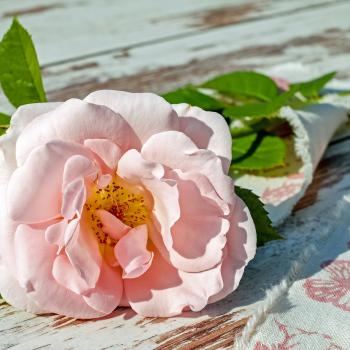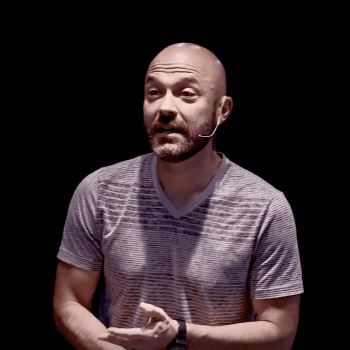I recently came upon a link to an article on a conservative Christian website comparing courtship with dating. Skimming the piece, I noticed one bit in particular that I found troubling, having grown up in a courtship culture myself.
Benefits?
So what are the benefits of pursuing the possibility of marriage without becoming boyfriend/girlfriend?
You will be able to avoid having to:
— Experience the broken oneness and pain of one minute being someone’s partner and the next minute being their ex.
— Be the cause of someone experiencing the rejection, heartbreak and harm of being dumped.
— Experience or cause the public shame associated with an “official”, public boyfriend/girlfriend relationship breaking up.
— Waste precious childbearing years being “off the market” with a person who may not end up marrying you.
I’m sorry, what?
This article was written by blogger Rowina Seidler. I can’t find a bio, but her Facebook suggests that she married several years ago and now has a growing baby. I am curious how Seidler managed to avoid ever witnessing the fallout of a broken courtship. Courtship does not get rid of the pain of a breakup—not in the least! In many ways it can make it worse! And the idea that you avoid the “public shame” associated with a boyfriend and girlfriend breaking up? What even is that?! First, I’m not familiar with this public shame, but second, there is shame involved in an ended courtship—arguably far more shame than associated with a boyfriend and girlfriend breaking up!
Let me slow down for a moment and explain some of the concepts involved here. Those who promote courtship draw a variety of contrasts between courtship and dating. The basic most fundamental difference they point to is that courtship involves a couple getting to know each other with marriage in mind—to see if they are a good match—while dating is often more casual. This of course ignores the fact that dating often is getting to know each other with marriage in mind, to see if you’re a good match, but it’s true that plenty of couples date who aren’t at a place in their lives where they want to marry, so we’ll leave that be for now. Courtship generally also has more family and community involvement than dating.
Because a courtship is intended to end in marriage, starting a courtship is a very big deal. It’s not something you do lightly. An announcement of a courtship is in some ways similar to an announcement of an engagement. It has an enormous amount of gravitas. There is a lot invested in making the courtship work out, and if a courtship ends without leading to marriage, well, it’s tantamount to a failed engagement. I’ve seen courtship proponents argue that it shouldn’t be this way, that a courtship that ends without leading to marriage is not a “failed” courtship because the point of courtship is not to lead to marriage but rather to determine whether or not a couple should marry. While I understand that argument in theory, it doesn’t tend to feel that way in practice.
What I’m trying to get at is this: Breaking off a courtship is a much bigger deal than ending a boyfriend/girlfriend relationship precisely because courtship is and is intended to be a much bigger deal than dating. Think of the grief involved when a couple calls off an engagement. I realize that a courtship and an engagement are not identical, but there are a lot of similarities and this really is the biggest approximation for the feelings involved that I can find. It’s intense.
I’m not the only one to make such comparisons. Even conservative evangelical World Magazine has covered these problems. Take a look:
There’s the dilemma. Some guys will only ask a girl out if there’s a high degree of probability it will end in marriage. But some young women hate that pressure: “Saying yes to a date is not saying yes to a proposal.” College senior Susannah Foote felt that pressure. She is coming off a failed relationship: “It would have ended earlier without all the pressure. . . . You can’t hang out. You go from zero to 100, or people will talk.”
. . .
PHC student Hannah Farver invested: Now she is “coming off a failed relationship” and a realization that some of what she formerly preached about courtship doesn’t work. Since she didn’t believe in “casual dating,” she had to be either emotionally separate from the guy, or engaged to him . . .
Courtship doesn’t save you heartache. It amplifies it. Courtship amplifies everything—the pressure, the community investment, the personal investment, and, yes, the fallout of a breakup.
I only courted once, and I have never experienced the pain of a breakup. But I can say with confidence, looking back on my courtship with my now-husband, that a breakup would have been incredibly painful. I went into my courtship with marriage in mind, just like I was supposed to. After a few months my parents withdrew their support and ordered me to call the relationship off—they saw my increasing independence as evidence that my beau was a bad influence on me—but even then I had no other pattern to go by, and continued to approach the relationship through a courtship framework and with marriage in mind. It was always serious, and never casual.
Perhaps courtship proponents would say that I did it wrong, that I invested too much of myself rather than remaining properly aloof. But that’s not the central problem here. The central problem is that when you make marriage the end game and involve both families and the entire community, you create a situation where a breakup is both incredibly public and incredibly personal. Because marriage is the de facto end game of courtship, it’s impossible not to make an investment. I suppose this might be different in courtships that are more like arranged marriages, but even then the couple would need to be kept in the dark with all of the details handled by the parents to prevent personal investment—and breaking a match off would still be very serious.
Do you know what else is ignored in Siedler’s piece? In courtship circles it’s not just sexual purity that matters, it’s also emotional purity. Too many failed courtships may compromise that emotional purity. There’s an enormous pressure in these circles for young women to marry the first young man they have a relationship with for just this reason. If dating is “practicing for divorce”, as it is called in these circles, courtship feels little different. There’s a huge amount of pressure to only begin a courtship if there is a fair amount of certainty that it will end in marriage—and if it doesn’t, there’s the chance it will damage a young woman’s future prospects.
I am not saying our current dating culture is perfect. I am saying that courtship is not the cure-all it is presented as. Indeed, it creates at least as many—and I would argue more—problems as it claims to solve, and some of the things it claims to fix it actually makes worse. I understand that there are parents concerned about protecting their children from harm, and that a lot of young people are worried and uncertain. I get it. But there is no perfect formula for avoiding pain. There just isn’t. Sometimes we have to take risks in life, and make decisions with the best information we have, and grow and learn through our mistakes or missteps. It’s called being human.
Courtship is not a magic fix, and as someone who grew up in a courtship culture, it’s troubling to see it presented as such.















